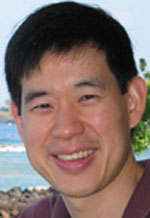Bio: Edward Yu joined the UCSD faculty in 1992, after a one-year postdoctoral appointment at the IBM T. J. Watson Research Center. He received his Ph.D. in Applied Physics from the California Institute of Technology in 1991, and graduated summa cum laude in physics from Harvard University in 1986. Yu is a recipient of an NSF CAREER Award, an ONR Young Investigator Award, an Alfred P. Sloan Research Fellowship, and the UCSD ECE Graduate Teaching Award. He currently serves as Vice chair of the TMS Electronic Materials Committee, Program Chair of the Electronic Materials Conference, Chair of the the Nanometer-Scale Science and Technology Board of the AVS, and is an alumnus of the DARPA/IDA-sponsored Defense Science Study Group.
Research: Professor Yu heads the Nanoscale Characterization and Devices Laboratory at UCSD, which is concerned generally with the characterization, understanding, and application of physical phenomena and of material and device properties at nanometer to atomic length scales. Research activities in his laboratory focus on advanced semiconductor materials and devices, and also include the investigation of nanometer-scale properties of thin-film magnetic materials and of novel nanoscale structures for use in chemical and biological sensors. A major current effort in his research group is directed towards Group III-nitride semiconductor materials and device technologies, which are of enormous interest for use in visible light emitters for applications ranging from high-density data storage to solid-state lighting, and in high-speed, high-power electronics for communications and related applications. Additional projects in Yu's research group focus on exploration of materials and concepts in the emerging area of spin-based electronics, and on the design, fabrication, and application of nanoscale electronic and photonic device structures for chemical and biological sensors. His laboratory is also one of the leaders worldwide in the development and application of proximal probe imaging techniques, and uses these techniques extensively to study a broad range of materials and device structures at the nanometer scale
|

